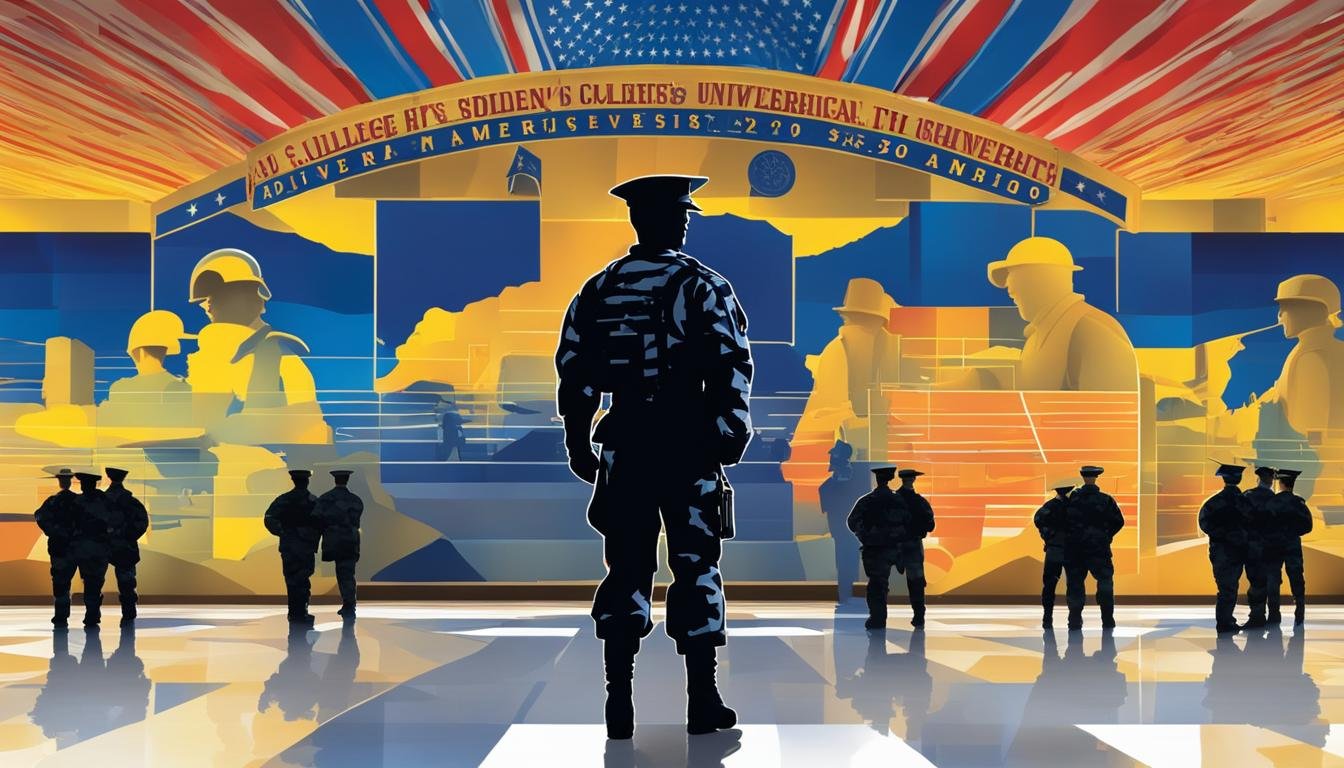Military service offers numerous educational benefits for college students, providing a valuable pathway to higher education. Whether you are currently serving or have completed your military service, leveraging these benefits can save you money and enhance your educational experience.
During your time in the military, you have access to various programs that support your educational endeavors. One of the most significant benefits is Tuition Assistance, which can cover up to $4,500 per year. Additionally, the GI Bill encompasses several education programs, including the Post-9/11 GI Bill and the Montgomery GI Bill, providing financial support and resources to pursue your academic goals.
By utilizing these military education benefits, you can transform your military experience into a valuable asset for college. Here’s how:
Key Takeaways:
- Military service offers a range of educational benefits for college students.
- Tuition Assistance can help cover up to $4,500 per year in college expenses.
- The GI Bill includes programs such as the Post-9/11 GI Bill and the Montgomery GI Bill.
- Take advantage of Tuition Assistance, GI Bill benefits, and other resources provided by the military.
- Maximize your military service by leveraging your experience for college success.
Education Benefits Available to Servicemembers

Military service provides a range of education benefits for servicemembers, helping them pursue their academic goals and save money on tuition expenses. Let’s explore some of the key education benefits available to servicemembers:
Tuition Assistance
One of the main education benefits is Tuition Assistance, which covers the cost of tuition and some fees. This benefit is available to almost all military servicemembers, regardless of rank or branch. Tuition Assistance can be a significant financial resource, providing up to $4,500 per year to help servicemembers further their education.
Post-9/11 GI Bill
The Post-9/11 GI Bill is another valuable education benefit that offers up to 36 months of educational assistance. This includes coverage for college, vocational courses, apprenticeship/job training, and more. The Post-9/11 GI Bill also provides a housing stipend and book stipend, making it even more financially beneficial for servicemembers.
Montgomery GI Bill
The Montgomery GI Bill is an education benefit available to servicemembers who have completed a certain length of active duty service. Similar to the Post-9/11 GI Bill, it provides funding for education expenses, including college and vocational courses. The eligibility for the Montgomery GI Bill depends on the length of active duty service.
College Fund Programs
Some branches of the military offer College Fund Programs, which provide additional funding for education. These programs can be a great way for servicemembers to receive extra financial support while pursuing their academic goals.
Loan Repayment Programs
Military Loan Repayment Programs are designed to help servicemembers repay their college loans. These programs offer assistance in managing student loan debt, relieving some of the financial burden that can come with pursuing higher education.
ROTC
The Reserve Officers’ Training Corps (ROTC) is a program that offers scholarships and commissioning opportunities for college students. By participating in ROTC, servicemembers can receive financial support for their education and gain valuable leadership skills that will serve them well in their military careers.
Table: Summary of Education Benefits Available to Servicemembers
| Education Benefit | Description |
|---|---|
| Tuition Assistance | Covers cost of tuition and some fees |
| Post-9/11 GI Bill | Up to 36 months of education benefits, housing stipend, book stipend |
| Montgomery GI Bill | Education benefits based on length of active duty service |
| College Fund Programs | Additional funding for education |
| Loan Repayment Programs | Assistance in repaying college loans |
| ROTC | Scholarships and commissioning opportunities |
How Does Military Training Benefit Admission to College?
Military training can have a significant impact on college admission. The discipline, leadership, and problem-solving skills learned in the military can make applicants stand out. Admissions officers recognize the impact of military training and value the unique experience it brings to the campus community.
Other Education Benefits and Tips for Military Members
As a military member, you have access to a range of education benefits beyond just tuition assistance and the GI Bill. These additional benefits can help you save money and make the most of your military service while pursuing your education.
If you have student loans, you may be eligible for student loan deferment or forbearance, which allows you to postpone your loan payments while serving. This can provide much-needed financial relief and allow you to focus on your military duties without the burden of loan payments.
In addition to tuition assistance, there are other programs like Tuition Assistance Programs (TAP) that can provide financial support for your education expenses. TAP covers up to $4,500 per year and can be a valuable resource for reducing the cost of your education.
For those looking for a challenging and prestigious education, service academies offer a unique opportunity. These institutions provide a quality education and commissioning opportunities, allowing you to serve your country while earning a degree.
If you find that the benefits of the Post-9/11 GI Bill don’t fully cover your educational costs, you may be eligible for the Yellow Ribbon Program. This program helps cover expenses that exceed the maximum benefits provided by the GI Bill, ensuring that you can pursue your education without financial strain.
Lastly, don’t forget about the option to transfer your GI Bill benefits to your spouse or children. This can provide them with valuable educational opportunities and ensure that your entire family benefits from your military service.
By taking advantage of these education benefits and exploring all available options, you can maximize the value of your military service and create a pathway to a successful future.



